Robby Krieger is best known for being the co-founder and guitarist for the legendary band The Doors, and his eclectic playing and songwriting were key components of the band’s sound.
The first Doors album, which turned 50 years old earlier this year, is a landmark in rock music, and contains such classics as “Break On Through (To the Other Side)”, “Soul Kitchen”, “The Crystal Ship”, “The End”, and “Light My Fire”, the latter of which was written by Krieger.
The Doors went on to record five more acclaimed studio albums before singer Jim Morrison died, including the songs “When the Music’s Over”, “Hello, I Love You”, “L.A. Woman”, “Riders on the Storm”, and others with particularly significant Krieger songwriting contributions like “People Are Strange”, “Peace Frog”, “Touch Me”, “Love Her Madly”, and “Love Me Two Times”.
After The Doors’ demise, Krieger and Doors drummer John Densmore founded The Butts Band, which released two mid-Seventies albums. Krieger has also released several solo recordings, including the 1977’s underrated Robbie Krieger & Friends.
This interview was for a preview article for noozhawk.com for Krieger’s concert on 4/8/17 at the Libbey Bowl in Ojai California. It was done by phone on 3/29/17. (L. Paul Mann photo)
Jeff Moehlis: This is for a preview for your upcoming show in Ojai, but I write for a Santa Barbara-based publication. I’ve read that The Doors performed seven times in Santa Barbara between 1966 and 1968. Do you remember anything about those shows?

Robby Krieger: [laughs] The only one I remember really is the Earl Warren Showgrounds show that we did with the Grateful Dead [on 4/29/67]. That was kind of like a nightmare. We had a show earlier that same day at Beverly Hills High School, so from that show we had to run up to Santa Barbara. We didn’t have time to load our gear up or anything – we just grabbed the guitars. We said, “No problem, The Dead, they’re from San Francisco. They’ll let us use their gear.” Because we’d played with The Airplane a couple times, and we always used their stuff or they used our stuff.
So we get up there, and The Dead guys were just, “No no, nobody plays our stuff. Sorry.” I thought, “Oh my God, this is a San Francisco group? Man, this is not cool.” So I ended up playing out of like a Pignose or something like that, or maybe it was a Fender Champ, or something like that that somebody had. Pigpen wouldn’t let Ray [Manzarek] use his organ [laughs], so he had to scuffle around and borrow somebody’s electric piano or something. It was kind of a nightmare [laughs]. But we got through it.
JM: And I understand that you went to UCSB for one year.
RK: Yeah, that’s right. That was my first year of college. I was a Gaucho, and stayed out at Anacapa Hall. That was cool, right on the beach there. It was almost too idyllic, you know what I mean? After a year of that I couldn’t take it anymore. But it was cool. There was a lot of music happening up there. There were a couple of clubs.
I was doing folk music at the time, and flamenco. I was giving flamenco lessons. And I had a flamenco teacher there named Frank Chin, who was a Chinese guy, a really good flamenco teacher. And then in turn I would teach the guys in my dorm. So that was kind of cool.
There was a guy, Bob Brinkmeyer or something like that, and he ran the radio show out at the college. So we did a lot of shows with him, you know, just on the college radio station.
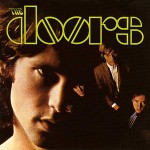
JM: Of course, this is a big year in the history of The Doors, with the first album having recently turned 50 years old. All these years later, what are your reflections on that first album?
RK: It was kind of scary doing that first album. We knew we had great songs because we had been playing them every night at the Whisky and places like that, and people had just been going crazy. Especially when we played “Light My Fire” or one of those. The only problem was getting it on tape, and getting it to sound something like it sounded live.
But we were very lucky that we had good people we were working with. Paul Rothchild was the producer, and Bruce Botnick [was the engineer]. Before us, they did the Love album – you know, Arthur Lee and Love. That was the first rock ‘n’ roll thing that was on Elektra Records. Because Elektra Records was not a major label, they were like a folk music label. They did stuff like Judy Collins.
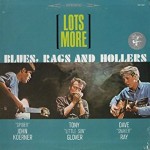
But the cool thing was that the records I was listening to when I was in college, it seemed like a lot of them were produced by Paul Rothchild – like Paul Butterfield Blues Band. He did a lot of blues stuff that I was listening to. There was a thing called The Blues Project, and then he did a couple of records with these guys Koerner, Ray & Glover. I was just crazy about those records. I really got a lot out of that stuff, and I stole a lot of licks from them [laughs]. The funny thing was I was just up in Minneapolis last year, and I met John Koerner, who was one of those guys. I had met him one time before about 50 years ago, and he’s still doing it up there.
JM: Do you feel like the studio recording captured the live show?
RK: No, we didn’t think so. You know, it never sounds as good in the studio as it does live, obviously. Live, you’re cranking it up and you get the sound of the hall and everything, but in the studio you can’t do that because everything would leak onto the other tracks. And actually, our first album was [recorded on] only four tracks. Really, it was more like recording two track, because we had to save one track for the vocals and one track for any overdubs. The drums and the bass were on the left side, and the guitar and the organ on the other side stereo-wise, and then the voice was in the middle. You try to get the live sound, but it never quite sounds that good.
But luckily, like I said, we had good guys that were working with us. Bruce Botnick was a great engineer – he had done The Supremes and a lot of stuff. And Sunset Sound, where we recorded, they had this live echo chamber that really sounded amazing. If you notice on that first album [laughs], it’s pretty echo-y. Maybe too echo-y [laughs], looking back. But, you know, I think we got a really good sound for what we had to work with. Of course, when you listen back you’re never quite satisfied. “Man, it doesn’t sound like how we sound live.” But it had it’s own sound, and everybody seemed to love it. So in the end, it was all good.
JM: That album had the long version of “Light My Fire”, which you wrote. How did that song come together?
RK: At that point, Jim [Morrison] had been the writer. Nobody else had written any songs, including me, although I had written a few licks here and there with other bands. So at one point we realized that we didn’t have enough of our own material, because we used to do covers as well when we would play live. And Jim said to the other guys, “Well, why don’t you guys try and write something? I’m doing all the work here” [laughs]. So I said, “OK, I’ll try it. What should I write about?” And he said, “Write about something universal, something that won’t go out of style in two months. And write something that people can put their own spin on. You want it to mean different things to different people.”
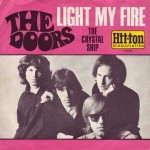
So I thought about writing about the four elements – earth, air, fire, and water. For the first song I thought I’d do fire, because I liked that song by The Stones “Play With Fire”. So that’s how I went about writing “Light My Fire”. It took me two or three days to come up with that. And just the words “light my fire”, nobody had said those three words before, and I thought that was pretty cool [laughs].
JM: You guys had been together for about a year before you recorded the first Doors album. At what point did you realize that something special was going on with the band?
RK: I’d say when we got to the Whisky and started playing there every night. We were kind of the house band at the Whisky. We’d go on first, and then they would have the main act come in, usually some pretty big-name acts. Like they had Them, you know, Van Morrison, from the U.K. I think that was our second one. The first group that we played with was a famous group from Mexico called The Locos. That was pretty wild.
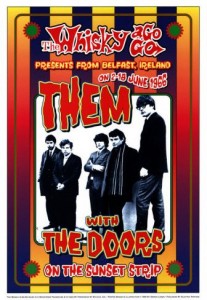
But anyway, so Them comes in. They were our idols. “Gloria” was one of the most amazing songs ever. So we got to hang out with those guys, and we learned a lot from them. I know Jim did. On the last night of the week that they played there we all played “Gloria” together, and that was amazing.
JM: Cool!
RK: Yeah, I wish somebody would’ve recorded that.
JM: I’m always struck by the diversity of guitar styles that you played with The Doors. How do you think your approach to rock guitar differed from the approach of your contemporaries?
RK: Well, you know, I started off playing flamenco, so I learned how to do the finger-picking thing and all that. So I never used a pick with The Doors. I think that kind of made me sound different. And also, by the time I started playing with The Doors I’d only been playing electric guitar for six or eight months. So I was really just learning.
Playing with Ray, especially, really molded my style. And John [Densmore]. I think had I been in another type of band my style would’ve been totally different. But we had so many diverse songs that it meant for a lot of freedom for me. And the fact that we didn’t have a bass player – you know, Ray played the bass with his left hand on the piano bass – that meant I could use a lot of those low notes that a guitar player wouldn’t normally use. I mean, he could do it, but it wouldn’t really be heard that much. So I think it just really was perfect for my style.
JM: I want to ask you about your solo for “When the Music’s Over”. I imagine that the first time I heard it, I was like, “What the hell was that?” [RK laughs] But now, having listened to it probably over a hundred times, it seems so awesome. Where was your mind at for that? What were you going for?
RK: The main thing was to get the sound right. You know, I knew kind of what I wanted to do. I wanted it to be kind of atonal, in a Coltrane kind of way, you know? So I tried to get a sound that would be almost like a violin, where I could just hold notes really long if I wanted to and they wouldn’t fade out. So I had this Maestro Fuzz-Tone thing that Gibson came out with back then – I think that was the one they [The Rolling Stones] used on “Satisfaction”. Because nobody was using those fuzz tones, hardly, back then. But it still wasn’t fuzzy enough, you know? I mean, it was fuzzy, but it didn’t hold the tone long enough.
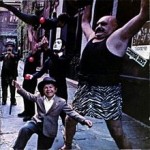
So Paul Rothchild, the producer, he looks in his bag – he had this bag with him all the time of little parts and stuff. And he had this little resistor in there, took it out, and they opened up one of the channels on the mixing board and stuck it in there, and soldered it in there somehow. And it just came out with this perfect sound, almost like a violin. Then I took a couple of puffs on a joint, which I didn’t really normally do when we were recording, but it just put me in the perfect mood. So I did maybe three or four takes of this solo, overdubbing it.
And then, we’d all had some of this weed, right? So Bruce Botnick, by mistake he played it back with two different takes at the same time, and somehow they just worked perfectly together. We said, “Oh my God, that’s it! Leave it like that!” So it kind of a happy accident. That is my favorite solo that I’ve ever done, I think.
JM: Then there was the epic song that was on the first album, “The End”, which has more of an Indian feel. What were you going for with that?
RK: I definitely wanted to get the Indian thing. I loved Ravi Shankar, and I used to listen to him every day. I took Indian music in school at UCLA. That was pretty cool – they had this whole room full of instruments. So I wanted to get some Indian music into our stuff, and this was before The Beatles went to India and all that stuff. So the first song we actually recorded for that first album, even though we didn’t use it until the Morrison Hotel album, was “Indian Summer”. For that song, I used this scale that I’d learned in that music class, in the Indian music class. And I wanted to do the same thing on “The End”.
When Jim and I wrote that, he was staying at my house for a couple of weeks, and we came up with a lot of those songs at that point. But “The End” started off… I said, “Let’s do something with an Indian kind of feel.” It just started off as like a three minute little love song. You know, “This is the end, beautiful friend”, when he was breaking up with his girlfriend. But, yeah, I definitely used an Indian motif in that one.
JM: When Jim was around, you guys released six albums in roughly four years, which seems like an amazing level of productivity. How did you guys do it? How did you keep up that sort of pace?
RK: I don’t know. That was sort of normal back then, I think. Yeah, nowadays for people to do that would be insane. For one thing, we weren’t touring all that much. I think we wanted to concentrate more on the records. You know, The Beatles were putting out a lot of stuff, and we wanted to keep up with them. And, really, Jim was so hard to deal with on the road that I think that was probably the reason we didn’t play more touring-wise. But that did give us more time in the studio, so when we were in town and we had nothing going we’d just go into the studio and start recording again.
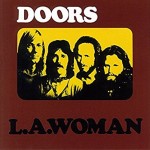
JM: The last Doors album with Jim Morrison was L.A. Woman. How were the recording sessions for that different from the previous albums?
RK: It was different, because we didn’t have Paul Rothchild, for one thing. He decided to opt out on that one. He was doing Janis Joplin, or something. With Paul, everything had to be perfect. It always took eight hours to get a drum sound. So, of course, Jim would by that time get drunk, so there was no way to get the vocal that night. So things just took longer and longer, it seemed.
We were tired of that, so we just said, “Hey, let’s bring the gear into our rehearsal place. It’ll be more relaxed that way.” And we got that album done really quickly compared to the last three or four. The first album was quick because we had to be quick. We only had a week to do it in. We didn’t have a lot of studio time. For L.A. Woman we had all the time in the world because we weren’t paying studio time. But it went really fast because it was just more fun. It was more like a jam kind of thing.
JM: What’s your favorite memory of Jim Morrison?
RK: I think, really, it was when he stayed at my house that time when my parents had gone to Europe or something, so we had about three weeks together and we just came up with a shitload of songs. At that time he wasn’t getting drunk or anything. That was the best time I can remember being with Jim.
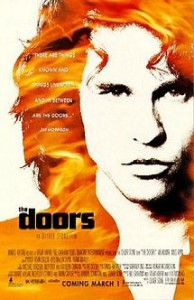
JM: What’s the craziest story that you’ve heard about The Doors or Jim Morrison that simply isn’t true?
RK: God… If you look at that Oliver Stone movie, there’s a part where they play “Light My Fire” and Jim lights the closet on fire with Pam inside it. You know, that was total bullshit. It never happened.
JM: The crazy thing is that seems almost plausible, at least given the myth of Jim Morrison.
RK: [laughs] Yeah, but he would never do something to hurt somebody, you know what I’m saying? He was a very gentle soul, really. You know, he’d let loud and drunk and stuff, but he would never try to hurt anybody.
JM: I do want to ask you about some post-Doors things, starting with your first solo album Robbie Krieger & Friends, which I really like but which sounds totally different from The Doors. What are your reflections on that album and what you were going for there?
RK: You know, 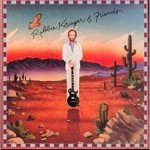 after The Doors I started hanging around with these jazz musicians, and I really wanted to learn how to play that stuff, because I loved Coltrane and Miles Davis and those kind of guys. So I started hanging around with guys like Sal Marquez, who was in Frank Zappa’s band and he’d had played with Buddy Rich and all these guys. He was just a great teacher. He always would teach younger guys like me how to play jazz, and what the chords were to learn and all the scales and stuff. So I started learning from guys like that. I wanted to do an album that was more in the jazz-rock vein. Jazz-rock was just getting going with Chick Corea and Larry Carlton. Larry Carlton was really my idol. I used to go see him play all the time, so I wanted to be kind of like that.
after The Doors I started hanging around with these jazz musicians, and I really wanted to learn how to play that stuff, because I loved Coltrane and Miles Davis and those kind of guys. So I started hanging around with guys like Sal Marquez, who was in Frank Zappa’s band and he’d had played with Buddy Rich and all these guys. He was just a great teacher. He always would teach younger guys like me how to play jazz, and what the chords were to learn and all the scales and stuff. So I started learning from guys like that. I wanted to do an album that was more in the jazz-rock vein. Jazz-rock was just getting going with Chick Corea and Larry Carlton. Larry Carlton was really my idol. I used to go see him play all the time, so I wanted to be kind of like that.
JM: Another thing you did after the Doors… A few years ago I interviewed Rick Wilder from The Mau Mau’s, and I know you did some recordings with them. What are your memories of that experience?
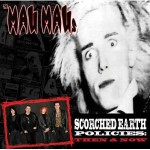
RK: It was kind of cool. You know, I never really got to see The Mau Mau’s when they were at their peak of popularity. But a friend of mine was buddies with him, and this guy would always put on parties and stuff, and I would sometimes go and help out and jam with whoever the band was. So one time it was The Mau Mau’s, and so I started listening to their stuff. Yeah, they’ve got some very cool stuff. And Rick is a pretty wild guy.
JM: Definitely [both laugh].
RK: Yeah, it was a lot of fun.
JM: Of course Ray produced some albums by X, and you did a little bit with The Mau Mau’s. Why do you think that the former Doors were receptive to the punk rock thing?
RK: Well, I think, in a way The Doors were kind of punk. In a way, even though we were a lot more sophisticated musically I guess, we still had some of that punk in us. You know, punk was the new thing. It was the next phase. You know, Jim always used to say, “Rock is dead. Rock is dead. Something new is gonna happen.” And that was it.
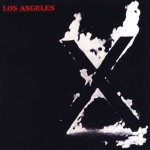
By the way, speaking of X, we just did a tribute to Ray Manzarek a couple months ago. John Doe and Exene came, and they did their version of “Soul Kitchen”. Actually, we’re going to put a film out on that pretty soon, so watch for that.
JM: That must’ve been cool. I’m a huge X fan, also.
RK: Yeah, and John sang “Riders on the Storm” and “Roadhouse”, I think. Yeah, he’s great. He loves singing The Doors stuff.
JM: What advice would you give to an aspiring musician?
RK: You know, you’ve got to practice and all that. But I would say that when you’re starting out, don’t try to be too technical, because if you get caught up in all that you might not end up writing songs. I think writing is the most important thing. To me, the guys who are really good technically, they don’t end up writing the good songs.
In my case, for instance, I didn’t know hardly anything about music when I wrote “Light My Fire”. So to me, a minor chord was really cool [laughs], whereas if you’re in music school or whatever you wouldn’t even think of using just a plain old minor chord. So there’s something about the magic of music that you capture when you don’t know that much too soon. There’s always time to learn technical stuff in music, but if you want to get the magic you have to do it early and just try to feel it. Don’t get in your own way too much.
JM: I’ve heard that you’re working on your memoirs. What’s the status of that?
RK: Well, I kind of got stuck in the middle of it, so it’s kind of on hiatus. But I’m going to finish it. It’s definitely on the list.
JM: Did you ever read John’s or Ray’s books?
RK: Yeah, sure.
JM: What’d you think of those?
RK: Well, I thought they were great, except I just wish they wouldn’t have put each other down in the books, you know what I’m saying? Because that caused a lot of problems between all of us. I thought it was kind of a dumb thing to do. You know, if you don’t have something good to say, don’t say anything at all [laughs]. Especially in a book that people are going to be reading forever. So that’s my problem. I’m trying to figure out how to write a book without saying anything bad about any of the other guys [laughs].
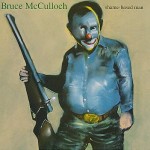
JM: Here’s a random question. There’s a comedian from a show called Kids in the Hall named Bruce McCulloch, and he has a song called “Doors” which a funny but awesome tribute to The Doors. Have you ever heard that song before?
RK: I don’t think so.
JM: I’ll send you a link to it. It seems to really capture the spirit of The Doors somehow.
RK: Yeah, I want to check that out.
JM: What do you see as the legacy of The Doors?
RK: I don’t know. That will have to be answered by history, I guess. I mean, in a way I see The Doors as the first punk band, but more than that, I see us as the quintessential L.A. band. I think it was just being at the right place at the right time, and that was L.A. I’m just glad we weren’t in San Francisco [laughs]. It would’ve been totally different.
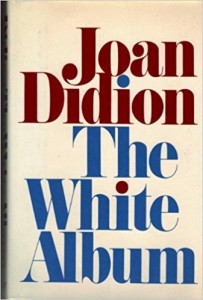
JM: You’ve probably read Joan Didion’s essay [“The White Album”] about California, which includes a section on The Doors. Do you remember when she showed up for that recording session?
RK: Yeah, she was there that night, wasn’t she?
JM: Do you think she accurately captured what was happening?
RK: God, you know I haven’t read that in so long. But I thought it was pretty cool, as I remember. What do you think?
JM: It’s interesting… She describes you guys playing and waiting for Jim Morrison to show up, and then after he showed up you guys just kept doing your thing. But it seemed like there was definitely a vibe there.
RK: Yeah, definitely. Yeah, she caught that one pretty good.
JM: Since this interview is for your Ojai show, can I ask who else will be joining you for that?
RK: My son Waylon is going to sing. He’s been singing with us now for about a year and a half. I’ve gotten some good comments on his singing. And then Phil Chen is playing bass, Ty Dennis on drums – the same guys that played with Ray and I for a few years. And then on keyboards we’ve got this guy Nathan Wilmarth. He’s a real Ray Manzarek nut. He grew up learning every one of Ray’s solos, and he collects all of Ray’s keyboards, not the exact ones, but the same ones that Ray had – the Vox organ… So he’s a dedicated Ray Manzarek clone [laughs]. Yeah, he’s very good. I don’t know if you ever saw that VH1 show that we did where we had all the different singers do the Doors stuff?
JM: No, I never saw that.
RK: You should check that out. Anyway, the keyboards that Ray used that night were all Nathan’s stuff.
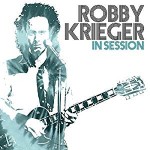
JM: You have a new CD out, the In Sessions CD. Can you tell a little bit about that?
RK: It was this company Cleopatra Records. I’d been doing sessions for them for maybe the last ten years. This friend of mine Billy Sherwood, who plays with Yes, was producing a lot of that stuff, so he would call me and say, “Hey, can you put a guitar on such and such?” They do a lot of tribute albums, Pink Floyd The Wall and The Beatles such and such album. I kind of like doing that kind of stuff. A lot of it is me playing on the electric sitar. So they wanted to put out an album of all the tracks that I was on. And I said, “Yeah, why not?” So that just came out recently.
I’m working on another record right now of my own material, with some of the guys from Frank Zappa. That should be coming out later this year. It’s new stuff. I had a thing called Robby Krieger’s Jam Kitchen in which we do jazz-rock kind of stuff, crazy Zappa-ish kind of music. So we’re recording that right now.
JM: Which Zappa guys are involved with that?
RK: My buddy Arthur Barrow, who I’ve done a lot of stuff with over the years. He was Frank’s bass player and bandleader back in the Joe’s Garage era. So it’s him and Tommy Mars, who also played back then with Frank. He’s the organ player, a really great keyboard player. And then Chad Wackermann, a drummer who played with Frank. You know, he plays with everybody. And another drummer Joel Taylor, who plays with a lot of different jazz guitar players, you know, Scofield and those kind of guys. We have some great horn players on there, too – Jock Ellis and Sal Marquez, who both played with Zappa, and a guy named Vince Denim who played with Michael McDonald.
JM: Sounds cool. When do you think that’ll come out?
RK: Hopefully by summer. I’ve got to get a title for that record – I don’t have one yet. Any ideas? [laughs]
JM: Wow, a Zappa and a Doors connection… I’ll let you know if I think of anything clever. But I definitely look forward to hearing that.
RK: I think you’ll like it.
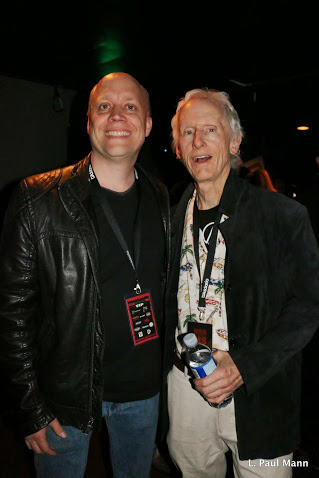
JM with Robby at the Whisky a Go Go in 2014. (L. Paul Mann photo)


Discussion
No comments for “Interview: Robby Krieger”